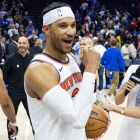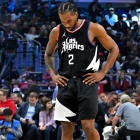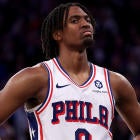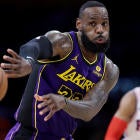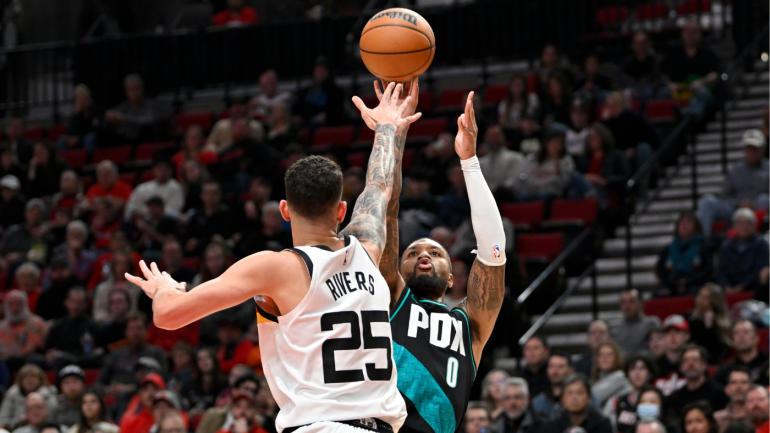
When we think of the player empowerment era in the NBA, we tend to think of a very small group of players. Ever since LeBron James shifted the balance of power in the league from owners to players with The Decision, superstars have found it increasingly easy to join their preferred teams. However, what frequently gets lost are the consequences for non-star players, who are frequently forced to change teams or leave money on the table as a result of those seismic shifts.
The Ringer's Austin Rivers, himself a long-time NBA role player and currently a member of the Minnesota Timberwolves, addressed some of these concerns as it pertained to the trade request issued by Portland Trail Blazers star Damian Lillard. Lillard has three years remaining on a contract he signed last offseason, yet his agent, Aaron Goodwin, has told teams that he would only be happy to play for the Miami Heat, which Rivers called "bad for the league."
"If you were a free agent then you could choose where you were gonna go. That's the business," Rivers said. "But when you're not and you sign a deal, man, that's part of the business bro. If you get traded somewhere, you've gotta go play, man. You know what I mean? Like, this started with James [Harden] and Ben [Simmons] and all these guys doing this s***, it's bad for the league."
Rivers then turned his attention towards the new collective bargaining agreement, which he argued benefits superstars to the detriment of role players. "This is why our CBA deal that we just signed, and I don't even wanna get heavy into that, that thing is, don't even get me f****** started on that deal that we got going because it's top heavy," Rivers said. "That's why we're seeing all these teams right now, you either make $50 million or $2 [million]. It's the most lopsided contract, teams, it's a joke bro. I can't tell you how many mid-level guys are signing for the vet minimum around the NBA. It's a scary dynamic when stars start acting like this. I'm not a big fan of it."
His final point, though, is perhaps the most illuminating. "I don't like when stars do that, because, it's just like, what does every other player do? So because you're a good player, you just don't have to show up?" Rivers asked. It's a fair question. Though we have not seen a player outright refuse to report to a team that he has been traded to, some stars have skirted that line. Simmons, for instance, sat out the 2021-22 season hoping the Philadelphia 76ers would trade him, though he did report to training camp only for then-head coach Doc Rivers (Austin's dad, if you didn't know) to kick him out of a practice. He then sat out due to a combination of mental health issues and a back injury. Harden's effort and conditioning have waned in the buildup to his two recent trades, and it is not clear how far he will go to leave the 76ers this time around.
The same is true for Lillard. While his agent has made it clear that he would only be happy to play for the Heat, he has not explicitly stated that Lillard would not report to any other team, or what his plans would be if the Blazers ultimately decided not to trade him before training camp.
These are rarely questions we have to ask about players with less stature around the league, though in fairness, a similar situation did play out last season for then-Phoenix Suns role player Jae Crowder, who sat due to his own desire to be traded. However, it should be noted that the Suns agreed to let him sit out so as to avoid the distraction his presence might cause. Generally speaking, less impactful players have little recourse when they want a trade and can't get one.
They usually have no recourse when a star player's trade request forces them to move against their will. When Harden was traded to Brooklyn, for example, a total of seven other players were moved in the deal. Those players were not empowered in the way that a star like Harden was. They also earned significantly less. The new CBA is exacerbating that problem. With the second apron creating a de-facto hard cap for some teams, front offices are skimping on role players in order to ensure the continued presence of their superstars.
The Phoenix Suns, for example, have four players earning at least $32 million, but no other player on the team is earning more than $3.2 million. Rivers' concern about mid-level players earning minimum salaries has also largely played out. Only 12 of 30 teams thus far have even dipped into their mid-level exceptions this offseason, according to tracking by Hoops Rumors. In many cases, that exception was split across multiple players, and in one instance, it was used to sign a draft pick to what was effectively a minimum-salary contract (E.J. Liddell with the Pelicans). Only one player earned the full, $12.405 million mid-level exception this offseason: Dennis Schroder with the Toronto Raptors.
Notably, a number of other teams might have used their taxpayer mid-level exception, but were unable to because the new CBA forbids teams above the second apron from doing so. This likely cost a few veterans millions of dollars, as mid-level deals they might have earned became minimum salaries by rule. The four teams that are currently above that line are the Warriors, Clippers, Bucks and Suns. Together, they have 15 players earning at least $20 million. Two other teams are close enough to the second apron line that they do not currently have access to the taxpayer mid-level exception: the Heat and Celtics. Boston has three $30 million players. The Heat will if they trade for Lillard.
The raw salary role players earn today looks enormous on paper. Magic Johnson played the bulk of his career on a 25-year, $25 million contract. Today, the rookie minimum is worth more than that on a per-year basis. But relative to their more famous peers, role players have less earning power or influence within the league than they used to.
While few players will likely admit it, Lillard's desire to play for only the Heat is just another push in that direction. If he does get his wish, several players who are not interested in moving will likely get included in the trade. The Heat will have less flexibility to pay role players because of their expensive big three. Superstars will have once again shown that long-term contracts cannot prevent them from picking their teams. They just have to leave their peers in the dust to do it.














